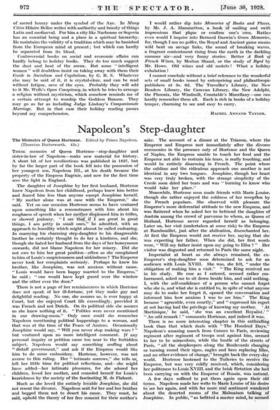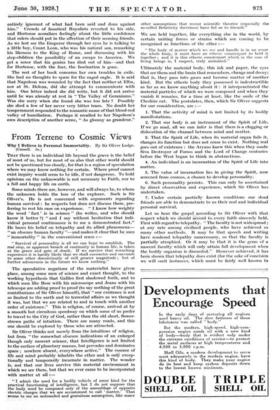Napoleon's Step-daughter
The Memoirs of Queen Hortense. Edited by Prince Napoleon. (Thornton Butterworth. 42s.)
THESE memoirs of Queen Hortense—step-daughter and sister-in-law of Napoleon—make new material for history. A short bit of her recollections was published in 1837, but by far the larger part of the book fell into the possession of her youngest son, Napoleon III., • at his death became the property of the Empress Eugenie, and now for the first time sees the light in England.
The daughter of Josephine by her first husband, Hortense knew Napoleon from her childhood, perhaps knew him better and feared him less than -anyone except Josephine herself. " My mother alone was at ease with the Emperor," she said. Yet on one occasion Hortense seems to have ventured upon something like a remonstrance with him about his roughness of speech when her mother displeased hint in trifles, or showed jealousy. " I see that if I am great in great things, I. am petty in small ones," he admitted, with an approach to humility which might almost be'ealled endearing. In marrying his charming step-daughter to his disagreeable brother he certainly thought to do her a kindness, and she, though she hated her husband from the days of her honeymoon onwards, did not blame Napoleon for her misery. Did she not owe to him her great positionpften as she complained to him of Louis's suspiciousness and unkindness ? The Emperor never took her complaints seriously. Perhaps he knew his brother, like Josephine, was not anxious without cause. " Louis would have been happy married to the Empress," he said ; " one would have kept guard over the - window and the other over the door."
There is not a page of her reminiscences in which Hortense does not speak of her ill-fortune, yet they make gay and delightful reading No one, she assures us, is ever happy at Court, but she- enjoyed Court life exceedingly, provided it was French and not Dutch. On its political side she assures us she knew nothing of it. " Politics were never mentioned in our drawing-room." Only once could she remember Napoleon mentioning political happenings to a woman, and that was at the time of the Peace of Amiens. Occasionally Josephine would say, " Will you never stop making wars ? " but ventured upon no more intelligent comment. If any personal inquiry or petition came to* near tO the forbidden subject, Napoleon would say something scoffing about " distaff government," and ask if the Empress would like him to do some embroidery. Hortense, however, was not averse to this ruling. Her " intimate sorrows," she tells use left her little time for political reflections, and—she might have added—her intimate pleasures, for . she adored her children, loved her mother, and consoled herself for Louis's bearishness by the society of the fascinating M. de Flahaiit. '
Much as she loved the entirely loinble Josephine, she did not resent the divorce. Napoleon sent for her and her- brother and begged them not to desert his cause. They must, he said, uphold the theory of her free consent for their mother's
sake. The account of a dinner at the Trianon, where the Emperor and Empress met immediately after the divorce ceremonies in the presence only of Hortense and the Queen of Naples, the Empress unable to touch her food and the Emperor not able to restrain his tears, is really touching, and would be entirely disarming in French. The point where the sublime and the ridiculous approach one another is not identical in any two tongues. Josephine, though her heart was very truly broken, with the strange simplicity of the Creole soon dried her tears and was " burning to know who would take her place."
Meanwhile, Hortense soon made friends with Marie j,ouise, though she rather -enjoyed the coldness of her reception by the French populace. She observed with pleasure the Emperor's more deferential attitude to the new Empress, and was flattered when he asked her to befriend the daughter of Anstria among the crowd of parvenus- to whom, as Queen of Holland, Hortense never regarded herself as belonging. Later on, her visit (undertaken at some risk) to the Empress at Rambouillet, just after the abdication, disenchanted her. At first the Empress would not receive her, saying that she was expecting her father. When she did, her first words were, " Will my father insist upon my going to Elba ? " Her visitor was disgusted and returned to Paris the same night.
Imperialist at heart as she always remained, the ex- Emperor's step-daughter soon determined to ask for an audience with Louis XVIII. She was, she felt, " under the obligation of making him a visit." " The King received me rose in his study. He se as I entered, seemed rather- em- barrassed, asked me to sit down beside him, and said nothing. I, with the self-confidence of a person who cannot forget who she is, and what she is entitled to, in spite of what anyone may do to make her forget it, opened the conversation and informed him how anxious I was to see Min." The King became " agreeable, even courtly," and " expressed his regret at not having had the privilege of knowing my mother. ' At Martinique,' he said, ' she was an excellent Royalist.' " " An odd remark ! " comments Hortense, and indeed it was.
There is no more interesting chapter in this enthralling book than that which deals with " The Hundred Days." Napoleon's amazing march from Cannes to Paris, reviewing regiment after regiment of troops sent against him, seemed to her to be miraculous, while the bustle of the streets of Paris, " all the shopkeepers along the Boulevards changing or turning round their signs, eagles and bees replacing lilies, and no other evidence of change," brought back the every-day world. Hortense hastened to the Tuileries to receive the Emperor, but was very coldly received, which, considering her politeness to Louis XVIII. and the brisk flirtation she had been carrying on with the Emperor of Russia, was natural.
A few days sufficed to put them again upon their old terms. Napoleon made her write to Marie Louise of his desire to see her again, and with far more real sentiment wandered about the deserted rooms of the Malmaison talking of Josephine. In public, "as befitted a master mind, he seemed entirely ignorant of what had been said and done against him." Crowds of fanatical Royalists reverted to his side, and Hortense moralizes feelingly about the little confidence that rulers should put in the affection of their seeming friends. As we last see the Emperor through her eyes he is talking to a little boy, Count Leon, who was his natural son, remarking his likeness to the King of Rome, and discussing with his step-children the possibility of an escape to America. We get a sense that his genius has died out of him—and that for Hortense, with the fear, the fascination is gone.
The rest of her book concerns her own troubles in exile. She had no thoughts to spare for the caged eagle. It is said that Napoleon was wounded by the fact that neither at Elba, nor at St. Helena, did she attempt to communicate with him. One letter indeed she did write, but it did not arrive until he was already at rest in " The Valley of Geraniums." Was she sorry when she found she was too late ? Possibly she shed a few of her never very bitter tears. No doubt her temperament responded to the romantic name of that blood-red valley of humiliation. Perhaps it recalled to her Napoleon's own description of another scene, " As gloomy as grandeur."









































 Previous page
Previous page